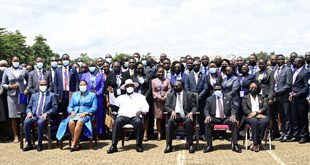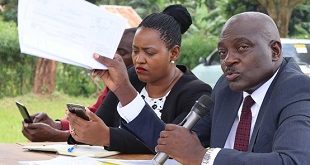
By Sarah Namulondo
The IGP of police Gen Kale Kayihura has warned individuals against making reckless statements to the media about the mysterious death of Butaleja Woman MP Cerinah Nebanda.
Kayihura told off individuals who have been making such statements to stop because it undermines police investigations.
He said several politicians have hinted directly and indirectly that Nebanda was poisoned and died at Mukwaya clinic on Dec 14.
Kayihura said he wishes to advise such persons that there are laws that protect Police investigations, and they shall not hesitate to take action against anybody violating those laws.
However he concluded that whoever has useful information about the tragic death of Hon Nebanda should bring it to the Police to assist in investigation.
Below is Kayihura’s statement in full.
On Friday, 14th of December, 2012, at around 9.00pm, Police got information that the Hon. Cerinah Nebanda, the Woman MP for Butaleja, had passed away in Mukwaya General Clinic, in the Nsambya suburb of Kampala City.
Police, immediately, commenced investigations, the objective of which is to establish the cause, and circumstances leading to the death of Hon. Nebanda.
As part of the investigation, and consistent with standard procedure where death has occurred, Police requested the Mulago Hospital to carry out a post-mortem examination on the body of the deceased.
Indeed, the following day, Saturday, 15th December 2012, the post-mortem examination was carried out. The examination was conducted by a team of pathologists, led by Prof. Henry Wabinga, a Senior Pathologist from Makerere University, Department of Pathology, and included the Head of Police Medical Services and a Pathologist, Dr. Moses Byaruhanga.
Police allowed representatives from the family, and from some members of Parliament, at their request, to observe the post-mortem examination.
It is important to point out that Police requires post mortem examinations because they are critical source of evidence in determining cause of death.
As the results of the post-mortem examination in Mulago hospital were not conclusive, the team of pathologists referred to the Government Analytical Laboratory certain samples for further tests.
It is only after the team of pathologists has received results of the forensic tests from the Government Analytical laboratory that determination of cause of death can be made in a certified post mortem report, which is submitted to the investigating officers of the Police.
 The Independent Uganda: You get the Truth we Pay the Price
The Independent Uganda: You get the Truth we Pay the Price


